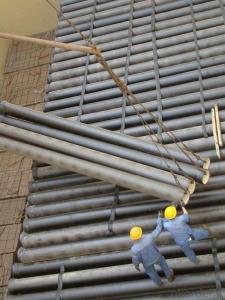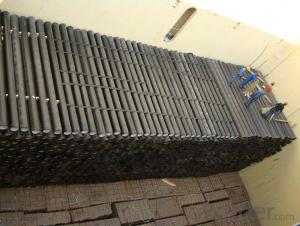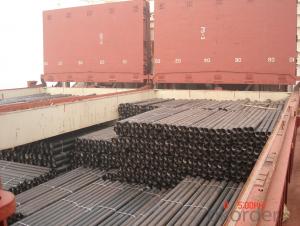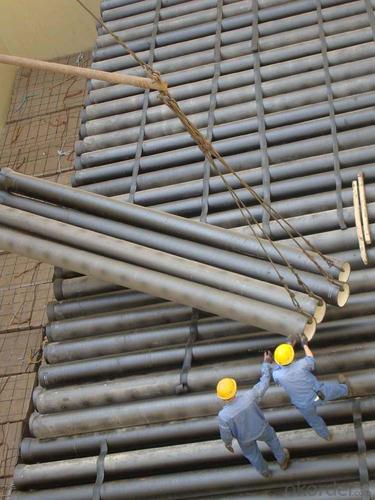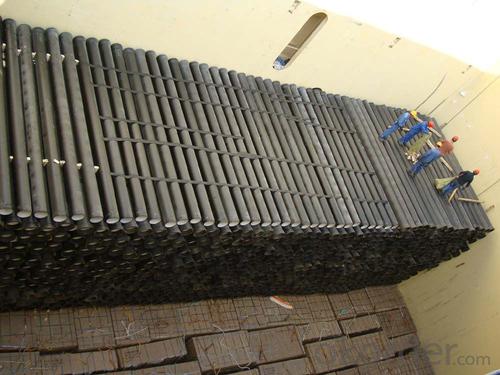DUCTILE IRON PIPE DN300 K8/C/K9
- Loading Port:
- China Main Port
- Payment Terms:
- TT OR LC
- Min Order Qty:
- -
- Supply Capability:
- -
OKorder Service Pledge
OKorder Financial Service
You Might Also Like
Specification:
1) The standard of pipe: ISO2531:1998, K9
2) Effective length: 6m
3) Inner cement line: Portland cement line as per ISO4179
4) Zinc coating: at least 130g/m2 as per ISO8179
5) Bitumen painting: at least 70um as per ISO8179
6) With 100% quantity of NBR ring, or SBR ring, or EPDM ring as per ISO4633
7) DN80mm-800mm
8) High strength, lighter than grey iron, good corrosion resistance, no furring, small flow resistance, easy fixing, long life tome about 100 yeas
9) Produced by Hangzhou chunfeng machine
10) Checked by automatic inspection equipment
11) Composition:
Chemical composition | | | | |||
Chemical composition | Ductile Cast Iron Pipe (%) | Grey iron pipe (%) | Steel pipe (%) | | | |
C | 3.5-4.0 | 3.2-3.8 | 0.1-0.2 | | | |
Si | 1.9-2.6 | 1.4-2.2 | 0.15-0.4 | | | |
Mn | 0.15-0.45 | 0.4-0.6 | 0.3-0.6 | | | |
P | ≤0.06 | ≤0.3 | 0.02-0.03 | | | |
S | ≤0.02 | ≤0.1 | 0.02-0.03 | | | |
Mg | 0.03-0.06 |
|
| | | |
12) Feature:
Mechanical properties | | | | |||
| Ductile Cast Iron Pipe | Grey Iron Pipe | Steel Pipe | | | |
Tensile Strength(Mpa) | ≥420 | 150-260 | ≥400 | | | |
Yield Strength(Mpa) | ≥300 | No Confirmation | No Confirmation | | | |
Bending Strength(Mpa) | ≥590 | 200-360 | ≥400 | | | |
Elongation (%) | ≥10 | Neglected | ≥18 | | | |
Brinell Hardness(HBS) | ≤230 | ≤230 | About 140 | | | |
13) T type mechanical joint
14) Packing: in bulk or container
- Q: Can ductile iron pipes be used for railway bridges?
- Yes, ductile iron pipes can be used for railway bridges. They are commonly used in bridge construction due to their high strength, durability, and resistance to corrosion. Additionally, ductile iron pipes can withstand heavy loads and provide excellent structural support, making them suitable for railway bridge applications.
- Q: Can ductile iron pipes be used for underground oil and gas pipelines?
- Yes, ductile iron pipes can be used for underground oil and gas pipelines. Ductile iron is a strong and durable material that can withstand high pressure and corrosive environments, making it suitable for such applications. Additionally, its flexibility allows it to accommodate ground movement and settle effectively, reducing the risk of damage to the pipelines.
- Q: Is ductile iron pipe breakable?
- The ductile iron pipe has many uses in our city construction, for our city water supply, gas supply and so on. But ductile iron pipes are also very useful in sewage disposal. As we all know, ductile iron pipe has many excellent properties, such as high strength, corrosion resistance, high pressure resistance, low accident rate, long service life and Gao Yanshen rate. It is an excellent water supply pipe.
- Q: Which is better, ductile iron pipe and spray plastic pipe?
- Spray pipe is: plastic composite pipe, steel pipe is a new composite material as matrix, through a special process in high temperature curing by walls melt spraying or adsorption of food grade epoxy powder coating or PE as raw material. It has excellent corrosion resistance and relatively small frictional resistance.
- Q: How does ductile iron pipe perform in areas with high soil movement?
- Ductile iron pipe is known for its strength, durability, and flexibility, making it an ideal choice for areas with high soil movement. Unlike other types of piping materials, such as PVC or concrete, ductile iron pipe has the ability to withstand significant ground shifting without experiencing catastrophic failure. The inherent strength of ductile iron pipe allows it to resist the external forces exerted by soil movement, such as settlement, lateral movement, or ground heave. Its high tensile strength and ability to withstand bending stresses make it less susceptible to cracks, fractures, or leaks, ensuring the integrity of the pipeline system. Furthermore, ductile iron pipe has excellent deflection capabilities, meaning it can flex and accommodate ground movement without breaking. This flexural capacity enables the pipe to distribute the stress caused by soil movement along its length, reducing the concentration of forces at any specific point. In areas with high soil movement, ductile iron pipe also benefits from its corrosion resistance properties. The pipe is typically coated with a protective layer, such as cement-mortar lining or polyethylene encasement, which acts as a barrier against corrosive elements present in the soil. This protective coating helps to prevent damage and deterioration, ensuring the longevity and performance of the pipe even in challenging soil conditions. Overall, ductile iron pipe is highly recommended for areas with high soil movement due to its superior strength, flexibility, and corrosion resistance. Its ability to withstand ground shifting and distribute stress makes it a reliable choice for long-term performance and minimal maintenance requirements.
- Q: What are the typical maintenance requirements for ductile iron pipe?
- To maintain ductile iron pipe, it is necessary to conduct regular inspections, clean the pipe, and repair any damage. Inspections play a crucial role in identifying signs of damage, corrosion, or leaks. This can be done visually or using non-destructive testing techniques such as ultrasonic or magnetic particle testing. Regular inspections are important for detecting and addressing issues before they worsen and cause significant damage. Cleaning is another essential maintenance requirement for ductile iron pipe. Over time, sediment, scale, and debris can accumulate inside the pipe, reducing its flow capacity and potentially causing blockages. Regular cleaning methods like high-pressure water jetting or mechanical cleaning can remove these deposits, ensuring optimal flow and preventing problems related to reduced flow or pressure. Repairing any damage or corrosion is crucial for maintaining ductile iron pipe. If cracks, leaks, or other forms of damage are detected during inspections, prompt repairs are necessary to prevent further deterioration and potential failure. Depending on the extent of the damage, repairs may include welding, epoxy lining, or replacement of the affected section of the pipe. In addition to these specific maintenance requirements, implementing a comprehensive maintenance program is important. This may involve preventative measures such as cathodic protection to prevent corrosion or the application of protective coatings to extend the pipe's lifespan. Overall, regular inspections, cleaning, and repairs are necessary for maintaining ductile iron pipe. Following these maintenance practices ensures the pipe's longevity, reliability, and optimal performance, reducing the risk of failures and disruptions.
- Q: Do ductile iron pipes require external coatings or wraps?
- Yes, ductile iron pipes typically require external coatings or wraps for protection against corrosion. While ductile iron is known for its strength and durability, it is still susceptible to corrosion over time when exposed to certain environmental conditions. External coatings or wraps provide an additional layer of protection to the pipes, helping to prolong their lifespan and maintain their structural integrity. These coatings can vary and may include materials such as epoxy, polyethylene, or zinc, which act as a barrier between the pipe surface and corrosive elements in the surrounding environment. Additionally, wraps made of materials like polyethylene or polypropylene can also be used to provide mechanical protection against external factors such as impact or abrasion. Therefore, it is generally recommended to apply external coatings or wraps to ductile iron pipes to enhance their resistance to corrosion and ensure their long-term performance.
- Q: What is the expected corrosion protection system for ductile iron pipes?
- Typically, the expected corrosion protection system for ductile iron pipes involves a combination of external coatings, internal linings, and cathodic protection. To protect against corrosion, external coatings are applied to the pipe's exterior surface. These coatings, usually fusion-bonded epoxy, polyethylene, or polyurethane, act as a barrier against corrosion from soil, water, and chemicals. Furthermore, they play a crucial role in prolonging the pipe's lifespan. In order to safeguard against corrosion caused by the transported fluid, internal linings are applied to the pipe's interior surface. These linings, which can be made of cement mortar, epoxy, or polyurethane, provide a smooth and protective layer that prevents the formation of rust and scale. Cathodic protection is an electrochemical technique employed to shield ductile iron pipes from corrosion. It involves the utilization of sacrificial anodes or impressed current systems to generate a protective electrical current that counteracts the corrosion process. By employing this method, the formation of rust is prevented, thereby extending the pipe's longevity. It is important to acknowledge that the specific corrosion protection system for ductile iron pipes may differ depending on the application and environmental factors. To determine the appropriate corrosion protection system for a specific ductile iron pipe installation, consulting with corrosion experts and adhering to industry standards and guidelines is of utmost importance.
- Q: What are the risks in the process of conveying ductile iron pipes?
- Pile up: when the pipe is stacked, the lower part of the pipe should be covered with a tie or cushion block. The socket of the pipe is interlocked with each other, and the stop wedge must be put in place to prevent the pipe from rolling. Not allowed to be piled on marshes, rough slopes, or badly polluted areas.
- Q: Can ductile iron pipes be used in areas with high levels of groundwater contamination?
- Ductile iron pipes can be used in areas with high levels of groundwater contamination. Ductile iron is a strong and durable material that is resistant to corrosion, making it suitable for various environments, including those with contaminated groundwater. It offers a high level of resistance to chemicals and can withstand the corrosive effects of contaminants that may be present in the groundwater. Additionally, ductile iron pipes have a protective lining which further enhances their resistance to corrosion. However, it is important to note that the suitability of ductile iron pipes in such areas also depends on the specific nature and concentration of contaminants present in the groundwater. Consultation with experts and adherence to local regulations and industry standards is crucial to ensure the appropriate selection and installation of pipes for areas with high levels of groundwater contamination.
Send your message to us
DUCTILE IRON PIPE DN300 K8/C/K9
- Loading Port:
- China Main Port
- Payment Terms:
- TT OR LC
- Min Order Qty:
- -
- Supply Capability:
- -
OKorder Service Pledge
OKorder Financial Service
Similar products
Hot products
Hot Searches
Related keywords
